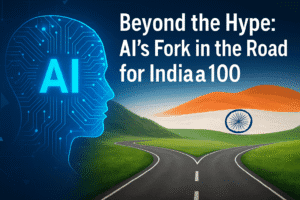Beyond the Hype: AI’s Fork in the Road for India@100
India’s path to becoming a $30-trillion developed nation by 2047 hinges critically on its approach to Artificial Intelligence. AI presents an unparalleled opportunity: it can hypercharge economic growth, enable leapfrogging in critical areas like healthcare and education, enhance governance for its vast population, and position India as a global innovator for emerging markets.
However, unmanaged AI poses severe risks, including massive job displacement without adequate reskilling, the amplification of social biases and inequality, potential erosion of privacy and democratic rights through surveillance, and strategic vulnerability through over-reliance on foreign technology.
Realizing AI’s promise while mitigating its dangers demands more than just adoption; it requires fundamental reforms. India must revolutionize education and lifelong learning, establish agile ethical regulations, bridge the digital and data divide, invest deeply in core research, and reimagine social safety nets. Ultimately, AI is a powerful tool reflecting India’s choices – its success depends on deliberate, inclusive, and ethical stewardship to ensure it uplifts the entire nation, not just a privileged few.

Beyond the Hype: AI’s Fork in the Road for India@100
As India charts its course towards the monumental milestone of its 100th year of independence in 2047, a single force looms larger than any other in shaping its destiny: Artificial Intelligence. The ambitious vision – a $30-trillion economy and developed nation status – hinges not just on policy reforms and economic grit, but critically on how the nation navigates the AI revolution. Is it India’s golden ticket or a potential trapdoor? The answer lies not in fate, but in deliberate, nuanced choices made today.
AI: The Unparalleled Opportunity Engine
The potential for AI to supercharge India’s ascent is undeniable:
- Economic Hyperdrive: AI can automate complex processes, optimize supply chains, boost manufacturing efficiency (think “Make in India 4.0”), and unlock entirely new industries. It could be the multiplier effect needed to sustain high growth rates towards that $30-trillion target.
- Leapfrogging Development: Imagine AI-powered diagnostics reaching remote villages via telemedicine, personalized learning platforms democratizing quality education, or precision agriculture maximizing yields for smallholder farmers facing climate change. AI offers tools to bypass traditional infrastructure limitations.
- Solving the Scale Paradox: Governing and serving 1.4+ billion citizens is a unique challenge. AI can enhance governance efficiency – from smarter resource allocation and fraud detection in welfare schemes to predictive policing and optimized urban planning.
- Global Leadership in Innovation: India’s vast talent pool, thriving startup ecosystem, and unique problem sets position it to develop BharatGPT – not just copies, but context-specific AI solutions for global emerging markets (affordable healthcare AI, multilingual interfaces, frugal automation).
The Looming Risks: Inequality and Erosion
However, embracing AI without foresight carries profound dangers:
- The Job Market Earthquake: Automation threatens not just routine manufacturing jobs, but increasingly roles in services, data entry, and even segments of IT. Without massive, rapid reskilling and upskilling initiatives (far beyond current scales), mass unemployment or underemployment is a terrifying possibility, fracturing society.
- Bias Amplification & Digital Divides: AI trained on biased data will perpetuate and potentially worsen social inequalities – in hiring, loan approvals, or policing. If AI access and benefits primarily flow to the urban, educated elite, the digital divide could become an uncrossable chasm, derailing inclusive growth.
- Surveillance Overreach & Erosion of Rights: Powerful AI surveillance tools in the wrong hands could enable unprecedented state or corporate control, chilling dissent and eroding privacy – fundamental values enshrined in India’s democratic fabric.
- Strategic Vulnerability: Over-reliance on foreign AI platforms or critical components creates security risks and stifles indigenous innovation. Lagging in core AI research (chips, foundational models) could make India a consumer, not a creator.
The Path Forward: Not Just Technology, But Wisdom
The insights curated by Business Today from experts like Manish Sabharwal (labour markets), Rajesh Shukla (consumer economy), Haseeb Drabu (finance), and seasoned bureaucrats underscore that AI isn’t a standalone tech issue. It demands interconnected reforms:
- Education Revolution 2.0: Overhauling curricula from primary to PhD to foster critical thinking, creativity, and AI literacy, not just coding. Lifelong learning infrastructure is non-negotiable.
- Ethical & Robust Regulatory Frameworks: Developing agile regulations that promote innovation while safeguarding citizens against bias, misuse, and job displacement. This requires deep collaboration between technologists, ethicists, policymakers, and civil society.
- Bridging the Data Divide: Ensuring equitable access to quality data (while respecting privacy) for Indian innovators to build relevant solutions. Public data infrastructure is key.
- Massive Investment in Core Research: Moving beyond application-layer innovation to invest strategically in semiconductor design, next-gen algorithms, and quantum computing – the foundations of future AI sovereignty.
- Social Safety Nets Reimagined: Exploring concepts like portable benefits, partial unemployment support, and stronger worker protections adaptable to the gig and platform economies fueled by AI.
The Verdict: Opportunity, But Only If Earned
AI is neither inherently India’s opportunity nor its risk. It is a mirror. It will reflect and amplify the choices India makes in the coming decade. Will it be deployed to uplift the many, governed wisely, and built on indigenous strength? Or will it entrench divides, displace without recourse, and create new dependencies?
The ambitious “India@100” vision demands treating AI with the seriousness it warrants – not just as a shiny tool, but as a societal force requiring deliberate steering. The transformative reform ideas discussed are crucial first steps, but their implementation, especially concerning AI’s integration, needs unprecedented urgency, collaboration, and ethical foresight. India has the talent and the scale. The question is whether it can summon the collective will and wisdom to make AI the engine of its greatest triumph, not the source of its hardest fall. The countdown to 2047 is on, and the AI clock is ticking fastest of all.
You must be logged in to post a comment.